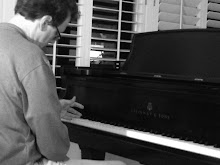Adagio Cantabile from Beethoven Sonata Op. 13 in C minor, “Pathetique”
After spending more time with Brahms and Bach this past year, I'm coming back to the early Beethoven sonatas, including Op. 7, Op. 10 No. 2, Op. 14 No. 2, as well as this treasure. I was probably inspired by my friend Andrew Rangell's new CD, a Bouquet of Beethoven. BTW, do we still call them CDs?
I spent some time on this piece this week. I didn't realize how fast I was playing until I listened to the recording. Hardly an Adagio, it's difficult to "sing" at this tempo, but unfortunately, so is life for me. I've been trying to slow down for the past few decades and haven't yet succeeded. I dream of not rushing one day-- while playing Beethoven, while walking to Caltrain, while spending time with my children...
When I think about the frenetic pace of my life, I'm reminded of the time in 2005 when I stepped down from job/career and focused on composing full time. One of the first pieces I wrote, before formally beginning my graduate studies at Stanford, was an orchestral set based on Dante's Purgatorio, which allowed me to explore this theme of life and time. Lacking an orchestra, I used Cubase and "virtual instruments" to create recordings, which didn't seem so awful back then (oh might was I wrong). Here are a couple pieces from that set, including "Calliope Arise" and "Femmina Balba II", which I more or less improvised on a keyboard that was plugged into Cubase to synthesize the cellos.
I spent some time on this piece this week. I didn't realize how fast I was playing until I listened to the recording. Hardly an Adagio, it's difficult to "sing" at this tempo, but unfortunately, so is life for me. I've been trying to slow down for the past few decades and haven't yet succeeded. I dream of not rushing one day-- while playing Beethoven, while walking to Caltrain, while spending time with my children...
When I think about the frenetic pace of my life, I'm reminded of the time in 2005 when I stepped down from job/career and focused on composing full time. One of the first pieces I wrote, before formally beginning my graduate studies at Stanford, was an orchestral set based on Dante's Purgatorio, which allowed me to explore this theme of life and time. Lacking an orchestra, I used Cubase and "virtual instruments" to create recordings, which didn't seem so awful back then (oh might was I wrong). Here are a couple pieces from that set, including "Calliope Arise" and "Femmina Balba II", which I more or less improvised on a keyboard that was plugged into Cubase to synthesize the cellos.
The Divine Comedy, Purgatorio, I,
1:12
Per correr miglior acque alza le vele
|
1
|
To run its
course through smoother water
|
omai la
navicella del mio ingegno,
|
2
|
the small bark
of my wit now hoists its sail,
|
che lascia dietro
a sé mar sì crudele;
|
3
|
leaving that
cruel sea behind.
|
e
canterò di quel secondo regno
|
4
|
Now I shall sing
the second kingdom,
|
dove l'umano
spirito si purga
|
5
|
there where the
soul of man is cleansed,
|
e di salire al
ciel diventa degno.
|
6
|
made worthy to
ascend to heaven.
|
Ma
qui la morta poesì resurga,
|
7
|
Here from the
dead let poetry rise up,
|
o sante Muse,
poi che vostro sono;
|
8
|
O sacred Muses,
since I am yours.
|
e qui Calïopè
alquanto surga,
|
9
|
Here let
Calliope arise
|
seguitando il mio canto con quel suono
|
10
|
to accompany my
song with those same chords
|
di cui le Piche
misere sentiro
|
11
|
Whose force so
struck the miserable magpies
|
lo colpo tal,
che disperar perdono.
|
12
|
that, hearing
it, they lost all hope of pardon.
|
|
Purgatorio, XIX, 10:14
|
||
Io
la mirava; e come 'l sol conforta
|
10
|
I looked at her,
and as the sun revives
|
le fredde membra
che la notte aggrava,
|
11
|
Cold limbs
benumbed by night,
|
così lo sguardo
mio le facea scrota
|
12
|
so my gaze gave
her a ready tongue
|
la
lingua, e poscia tutta la drizzava
|
13
|
And then in very
little time
|
in poco d'ora, e
lo smarrito volto,
|
14
|
straightened her
crooked limbs
|
